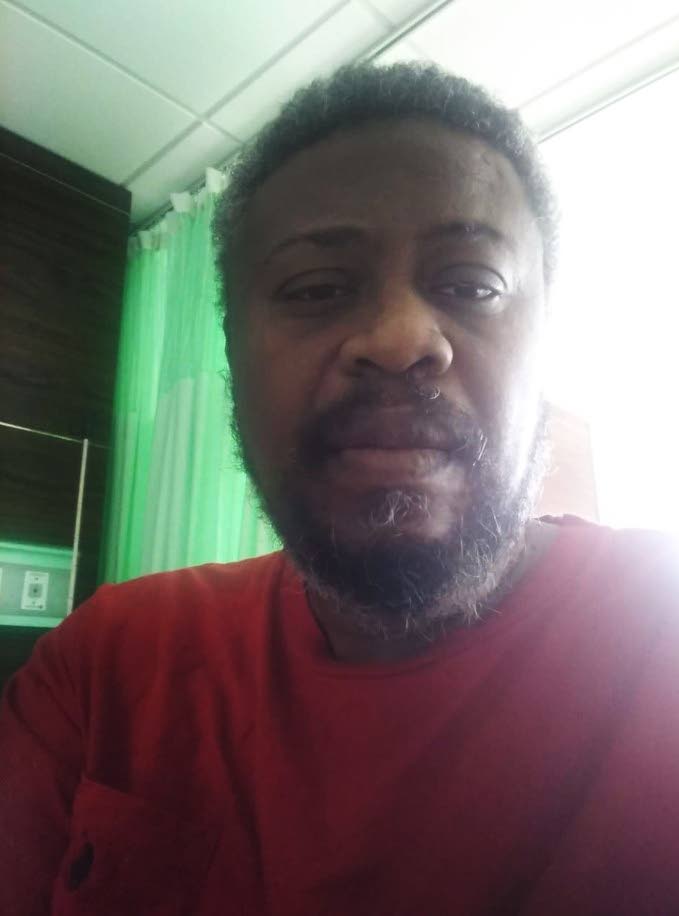‘Stop scorning us please’

VAN BERN SPRINGER is calling on the public not to scorn or discriminate against him and the other 108 people who have recovered from the covid19 virus.
To date, 117 people have fallen ill with the virus locally. Eight have died and all the rest are now back with their families.
Springer, of Arouca, tested positive on April 1 and spent five weeks in hospital. He does not know where he could have contracted the virus.
In an interview on Tuesday, Springer, a maxi-taxi driver, said he had to endure physical stress when hit by the virus which saw him away from his family and friends for five weeks while he was treated, then kept in quarantine until being given the all-clear to return home.
But life has not returned to normal.
“There’s a scorn out there,” the 50-year-old said. “I tell everybody, ‘I have to be afraid of you, you don’t have to be afraid of me. I got two negative tests to come outside. You haven’t been tested, and yet you are scorning me?’”
Springer said the person who came to pick him up from the hospital needed to hand him a few documents, but was reluctant because he was afraid of contracting the virus. In the days after he was discharged, many people kept their distance from him, or put on a mask when approaching or talking to him.
He said when he visited a friend, he was told to take off his shoes at the door before entering. Other friends who usually limed with him before he fell ill are no longer doing so.
“They now hail me out – but from a distance,” he joked.
He said those who recovered have faced discrimination on release.
“We who had it, have it a little hard with people in society…It’s all about scorn. But I got through the storm.”
He wants the public to know the fact that he was released is proof of his health.
“You could be looking good, sounding good and feeling good (but) if you do not get two (consecutive) negatives, you’re not getting out of there.”
Springer said those who have educated themselves on the virus are more understanding, but he has encountered many others, including some friends and even family members, who have given him a hard time. He said he has had many calls from concerned friends and family, expressing their relief that he was all right.
He is grateful to be out and healthy. “I got prayers from friends and family all over the world and I have been praying every day and every night. God is good.”
In early May, Newsday interviewed Springer while he was still at the Couva hospital, where he commended the nurses who dealt with him for being attentive and understanding to the needs of covid19 patients.
While he is grateful for the care he received at the hospital, he likened it to a “high-class jail,” saying it was not easy living in isolation for all that time.
“You wake up, check your vitals, eat lunch, check your vitals, have dinner and repeat. Every day...All you could do is sleep all day.”
There were always members of staff or other patients who went out of their way to keep things lively and keep each other in a good frame of mind.
“It’s not a nice thing, but it wasn’t so bad.”
Springer said emotional support is just as necessary as caring for the health of the patients.
“Every night going to sleep, knowing you could die in the morning…it’s frustrating. Then when you come outside, people watching you different.”
His job is not an issue, because he wears a mask, and he is hardly recognised from the earlier story.
“It’s like I’m hiding myself from the public with the mask,” he joked.
But he is sure those recovered patients who have to work in an office or at a company will have to face scorn and added pressure from those around them.
“In the same way you provide counselling and support if there is a death or a murder, get someone to counsel patients.”
Springer feels the government could also help educate the public on the virus, specifically destigmatising those who have recovered.
He said one of the positive things to come out of the experience is the opportunity to educate others, drawing on his experience. He wants the public to know how serious the virus is.
“This attacks your immune system…The common cold catches you if your immune system is down.
“Wear your mask,” he urges.
Springer believes more people have had covid19 than official figures indicate, saying they did not go for testing, but self-quarantined.
“When you see the figures, it’s not that.
“It is more than that. But what helped the situation is people followed orders by quarantining themselves.”
A second wave may follow, he worries, because of widespread chronic health conditions.
“We eat too much fast food. We are like Americans. We are not healthy.”
At the hospital, of the four people in his ward, three had diabetes, himself included, and one had high blood pressure.
“If something worse comes to TT, it will be problems. Try to eat healthy and live a healthy lifestyle and you have a chance.”
Springer said he developed high blood pressure because of the virus.
He condemned other maxi taxi drivers for driving with their air conditioning on.
Even with things getting back to normal, and drivers now allowed to run their taxis at 75 per cent capacity, he does not agree the air conditioning should be on.
“That is manslaughter. You are playing with people’s lives. Why? Just because you are feeling hot? That is not the point.”
He also condemned maxi drivers for letting passengers board with no masks on.
“All it takes is two or three local cases for us to go back to square one.”


Comments
"‘Stop scorning us please’"